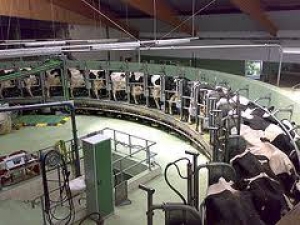The Solutions for dairy sector
Ag Council Discusses Welfare, Bluetongue & MRLs

The 3137th meeting of the Agriculture and Fisheries Council took place in Brussels on 15 to 16 December 2011, under the presidency of Marek Sawicki, Minister for Agriculture and Rural Development of Poland.
Main results of the Council
Concerning Fisheries, the ministers reached a political agreement on 2012 fishing opportunities for certain fish stocks for EU vessels in Union and certain non-Union waters and on fishing opportunities for certain fish stocks in the Black Sea.
Still in Fisheries, the Council had an exchange of views on the European maritime and fisheries fund and the proposal on certain measures in relation to countries allowing non-sustainable fishing. Ministers were also briefed on a proposal on certain measures in relation to countries allowing non-sustainable fishing.
As regards Agriculture, proposals for decisions authorising the use of four genetically modified (GM) varieties in food, feed and for other uses were presented to the Council for adoption. No qualified majority was reached either for or against the authorisations.
In addition, ministers had an exchange of views on the CAP reform proposal for a regulation on rural development.
Without discussion, the Council adopted conclusions on the future of the promotion of agricultural promotion policy.
Finally, the Council was briefed on the protection of animals during transport, on Codex Alimentarius negotiations, progress and prospects, on aid for processed citrus fruit and on decisions authorising the placing on the market of genetically modified organisms.
Over lunch, ministers discussed on risk management toolkit and innovation in the framework of the CAP reform (second pillar).
Welfare of animals during transport
The Council was briefed by the Commission on a report on the impact of regulation 1/2005 on the protection of animals during transport.
Several delegations welcomed the report, saying that they would look forward to the follow-up to this report. The future Danish Presidency indicated that this issue was one of its priorities.
The report describe progress on the application of the EU regulation on animal transport, and identifies several ways to address the problems that have arisen. However, the report is not accompanied by a legislative proposal. The Commission pointed out the need for a correct enforcement of certain measures and insisted on the harmonisation in the implementation of this regulation within the EU.
It was recalled that the Council had adopted regulation 1/2005 on protection of animal during transport in December 2004 after intense discussions over three consecutive Presidencies. Article 32 of Regulation 1/2005 instructed the Commission to present a report by 2011 "on the impact of the Regulation on the welfare of animals being transported and on the trade flows of live animals within the enlarged Community. […] This report may be accompanied if necessary by appropriate legislative proposals concerning long journeys, in particular as regards journey times, resting periods and space allowances."
Draft Codex strategic plan 2014-2019
The Presidency briefed the ministers on the report on progress and prospects of the Codex Alimentarius negotiations.
Four different Codex Alimentarius committees meetings had been held during the Polish Presidency, the most important of which had been, the session of the Codex Alimentarius Commission (CAC) itself in July 2011. The main outcomes of the CAC proceedings during the Polish Presidency were as follows:
- The organisation of a vote against the adoption of the maximum residues limits (MRLs) for ractopamine (a chemical used for growth promotion in pigs and cattle in certain third countries). If the proposed MRLs were adopted this might possibly result in a trade dispute between the EU and other WTO members.
- The election of a European vice-chair of the CAC
-
- the adoption of the list of acceptable previous cargoes for transport of edible fats and oils in bulk
- the adoption of the Guidelines for the control of Campylobacter and Salmonella spp in chicken meat
- endorsement of the Compilation of the Codex texts relevant to labelling of foods derived from modern biotechnology (GM food).
Several other outcomes included:
In addition, the draft Codex strategic plan for 2014-2019 will be discussed at the forthcoming 66th session of the Executive Committee of the CAC in February 2012 in Geneva. The discussion on the role of science and other important factors in Codex proceedings are key elements of that document. The Commission and the Member States are currently preparing comments on the Draft Strategic Plan.
Vaccination against bluetongue
The Council adopted its position at first-reading on a draft directive amending directive 2000/75/EC as regards vaccination against bluetongue (16696/11). The Council's position was pre-negotiated with the European Parliament with a view to reaching an early second reading agreement to allow the entry into force of the new rules in time for the vaccination campaigns of 2012.
The directive is aimed at updating the current rules on vaccination against bluetongue set out in directive 2000/75/EC by making them more flexible. Bluetongue is a disease affecting ruminants (such as cattle, sheep and goats) and is transmitted by insect vectors that spread the virus from one animal to another. Vaccination is the preferred tool for bluetongue control and prevention of clinical disease in the EU. The use of vaccines is, however, limited by the current rules set out in directive 2000/75/EC based on the only available vaccines at that time. These vaccines may lead to undesired circulation of the vaccine virus in unvaccinated animals in the areas where the vaccine has been used. The new rules introduced by this text are based on the fact that inactivated vaccines that are now available eliminate this risk.
Authorisation of four genetically modified varieties
Proposals for decisions authorising the use of four genetically modified varieties in food, feed and for other uses, but excluding cultivation, were presented to the Council for adoption. No agreement was reached either in favour of or against the authorisations.
Following the submission of initial applications for authorisation of these genetically modified varieties, the European Food Safety Authority (EFSA) had initially been consulted, as provided for by Regulation 1829/2003, and had issued favourable scientific opinions. On that basis, the European Commission drew up proposals for authorising these varieties, which were presented to the Standing Committee on the Food Chain and Animal Health (SCoFCAH). At its meeting on 9 February 2011, the SCoFCAH had been unable to achieve the qualified majority necessary to deliver an opinion for or against the authorisation measures proposed by the Commission. In the absence of an opinion it was up to the Council to act on the Commission proposals within a three-month period.
The Council noted that there was not a qualified majority either in favour of or against the following four proposals:
- proposal for a decision authorising the placing on the market of products containing, consisting of or produced from genetically modified cotton 281-24-236x3006-210-23 from Dow
- proposal for a decision authorising the placing on the market of products containing, consisting of or produced from genetically modified maize Bt11xMIR604xGA21 from Syngenta
- proposal for a decision authorising the placing on the market of products containing, consisting of or produced from genetically modified maize Bt11xMIR604 from Syngenta, and
- proposal for a decision authorising the placing on the market of products containing, consisting of or produced from genetically modified maize MIR604xGA21 from Syngenta
Now the Council has concluded its proceedings on this issue, the Commission is entitled to finalise the decision-making procedure in respect of all the proposals.
Decisions authorising the placing on the market of genetically modified organisms
The Hungarian delegation briefed the Council on the scope of Article 2c in decisions authorising the placing on the market of products containing, consisting of, or produced from genetically modified organisms (GMOs) (18417/11).
The standard Article 2c introduced since October 2007 in all decisions authorising the placing on the market of GMOs extends this authorisation beyond food and feed uses, i.e. to cover the same uses as any other relevant non-GMOs, with the exception of cultivation.
The Hungarian delegation, supported by Austria, Cyprus, Luxemburg, Slovenia and Greece expressed concerns about the authorisation of "any other uses" of GMOs which should be considered outside the scope of regulation 1829/2003 that was the legal basis for decisions on GMOs. While a risk assessment is carried out for food and feed purposes no such assessment is specifically performed for “any other uses”.
The Commission noted the Hungarian request and will check this legal aspect of the current wording of the regulation. The Council legal service will also analyse the Hungarian request.
Further Reading
| - | You can view the full report by clicking here. |





















